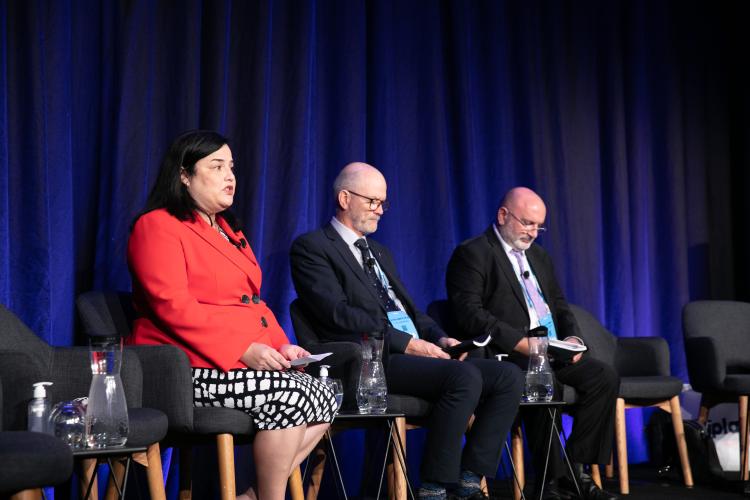Future of general practice
AMA Queensland President Dr Maria Boulton was part of a panel at the AMA National Conference about the challenges facing general practice.

AMA Queensland President Dr Maria Boulton took part in a panel at the AMA National Conference on the future of general practice. Here is her opening statement.
I begin by acknowledging the incredible contribution you and all our colleagues continue to make throughout the pandemic to support our patients despite the inadequate funding and support offered to hospitals, private and general practice. I have been a GP for 20 years, working in both regional and metro areas. Like many fellow practice owners, my business partner and I have pored through financial spreadsheets and innovated like crazy to ensure our continued viability in the past two-and-a-half years.
First to some successes. More than 61 million doses of COVID vaccines have been administered in Australia - 39 million in primary care and 31 million of those in general practice. This was done by 40,000 GPs and their practice nurses, who also administered an additional 10.5 million flu vaccines this year while continuing to provide medical care to their patients. That is a total of 41.5 million vaccines. Let that number sink in.
When journalists say that the government has funded the COVID vaccine rollout, I always correct them and say GPs funded it too, as the funding we received to undertake this mammoth task was not up to scratch.
Contrary to what some politicians say in the media, GPs never stopped caring for patients with respiratory symptoms. Many of us pivoted to telehealth, car consults, outdoor consults and self-funded fever rooms. Like our hospital colleagues, GPs have never been busier, so much so that many have continued working despite having COVID, providing telehealth consultations for their patients from home.
A typical day in general practice during the pandemic involves our receptionists answering hundreds of phone calls, more following health announcements by media, our nurses screening patients with respiratory symptoms and GPs doing their very best to fit in all of those who need care. The practice may have opened before hours or after hours, or even on the weekend to administer COVID or flu vaccines.
We all know that Medicare rebates for patients to access GP services are woefully low and that GP practices and corporates continue to collapse under the financial strain.
We need urgent reform to turn this around. We need to ensure all patients have access to GP care regardless of their bank balance or their postcode. We help people stay well and out of hospital. Yet governments don’t get it. In Queensland, the state government is seeking to replace GPs with allied health professionals who lack the training to know that a woman presenting with urinary frequency is not a simple issue. The Queensland government has approved pharmacists prescribing for UTIs and is looking to extend this to 23 other diseases including diabetes, hypertension, psoriasis and asthma.
AMA President Dr Omar Khorshid visited some of the sites in North Queensland where this will be rolled out. These are very vulnerable communities who already enjoy multidisciplinary team care with GPs at the helm. Experiments such as the UTI and the North Qld pharmacy prescribing trials place people at risk, fragment care and remove the separation between prescribing and selling.
The report from the Queensland University of Technology (QUT) that was used to justify the UTI prescribing experiment lacks scientific rigour and patient follow up, yet the Queensland government continues to use this as a justification to fulfil an election promise to a pharmacy body. Patients need doctors and not dangerous band aid solutions. AMA and AMA Queensland need your help in this fight for our patients’ sakes. If lost this will spread nationally.
Patients deserve continued access to their GPs. For this to happen, it needs to be adequately funded. They needed this yesterday. Given the load on general practice, any funding reform cannot place an increase burden on us.
Let’s discuss voluntary patient registration (VPR) for a moment. VPR is not going to work unless there is funding attached to it to improve patient outcomes. Most patients are loyal to their GP and practice. Administering VPR will need to be done easily through IT solutions and practices will need to receive an administrative fee to subsidise the staff costs required to implement it.
Medical receptionists have left the profession due to burnout. There are very few experienced receptionists seeking work. Where will the staff needed to administer VPR come from? Will VPR open more funding for chronic disease management? How about mental health care? There is a massive burden of mental illness in the community that GPs are managing at the moment. Patients cannot access psychologists or psychiatrists for months, in rural areas it may be years. Yet mental illness is the poor cousin to other chronic diseases like diabetes and heart disease.
Another emerging issue affecting GPs and private non GP specialists alike is payroll tax. Any funding initiatives considered will have to take this into account. General practice has proven to be the bedrock of healthcare once again with the incredible work we have done and continue to do during the pandemic. We do not need additional bureaucracy or hoops to jump through. We are busy enough caring for our patients and providing high quality evidence based healthcare. We care for our patients and community. It is time all levels of government care for Australians in the same way and ensure they continue to have access to their GP.